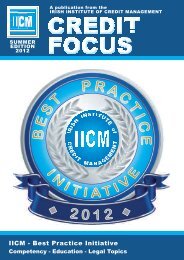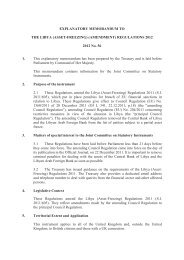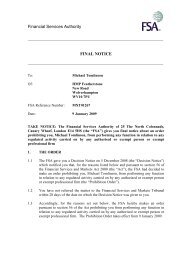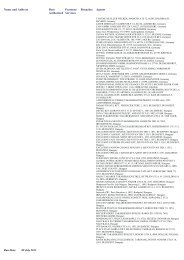FSA Annual Report 2006/07 - Better Regulation Ltd
FSA Annual Report 2006/07 - Better Regulation Ltd
FSA Annual Report 2006/07 - Better Regulation Ltd
You also want an ePaper? Increase the reach of your titles
YUMPU automatically turns print PDFs into web optimized ePapers that Google loves.
Section six – Appendices<br />
Appendix 2<br />
119<br />
implement EU directives, offer us an opportunity to introduce changes with<br />
the least additional disruption and cost. In changing these parts of the<br />
Handbook we have aimed, where possible, to move away from detailed,<br />
process-orientated rules and have relied more on high-level, outcome-focused<br />
principles and rules. As with all changes we make to our Handbook, we will<br />
consult on proposals before making any changes and all proposed changes<br />
will be subject to rigorous cost-benefit analysis. We expect principles-based<br />
regulation to achieve benefits for consumers by encouraging the senior<br />
management of firms to focus on the Principles and by fostering a more<br />
innovative and competitive financial services industry.<br />
Industry guidance<br />
To help firms determine how best to meet our expectations under more<br />
principles-based regulation we see a greater role for sector-specific guidance<br />
and support provided by industry associations, professional bodies or groups<br />
of firms. We will respond more fully to the feedback we received on our<br />
Discussion Paper in the third quarter of 20<strong>07</strong>, but where guidance has an<br />
impact on consumers an important factor in deciding whether we confirm<br />
the guidance will be how industry bodies have sought and considered the<br />
views of consumer representatives in the development of their guidance.<br />
Conduct of business simplification<br />
We are making a series of changes to simplify our conduct of business regime<br />
for investment business and, at the same time, to implement the Markets in<br />
Financial Instruments Directive. Our new rules will be consistent with our<br />
move towards a more principles-based approach to regulation. Rather than<br />
reducing the level of protection for consumers this approach should lead to a<br />
greater alignment of business and regulatory objectives, which in turn should<br />
benefit consumers by creating a more competitive and innovative market<br />
place. We will carry out a post-implementation review of the new Conduct of<br />
Business sourcebook to assess whether the desired outcomes for both<br />
consumers and firms are being achieved in practice.<br />
Most respondents to the consultation agreed with our proposal to remove<br />
the excessive charges rule, which we have never used or taken enforcement<br />
action under. Firms should, however, have regard to the new requirement to<br />
act honestly, fairly and professionally in accordance with the client’s best<br />
interests.<br />
It was not our intention to make any policy changes in the conduct of<br />
business rules applying to with-profits, simply to improve their wording and<br />
move to higher-level rules in some areas where this would not affect, or<br />
would improve, outcomes for consumers. We have sought to make this<br />
clearer in the rules we have now made.<br />
Costs and benefits of regulation<br />
Deloitte published their report on the costs of regulation in June <strong>2006</strong>. Most of<br />
the rules identified as imposing the highest incremental costs were in the retail<br />
investment and pensions advice sector and related to point-of-sale disclosure.<br />
We are using the results of the Deloitte study to assess the benefits of some of<br />
the regulatory requirements that generate the highest incremental costs. The<br />
benefits of regulation flow from improvements in market outcomes that would









